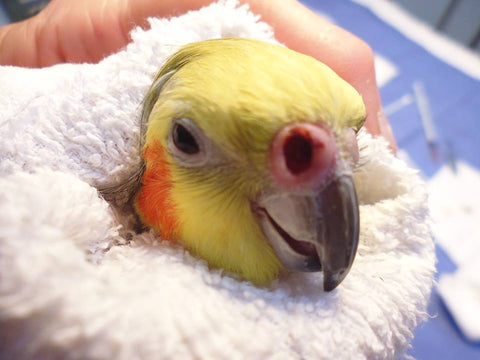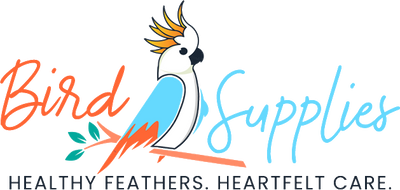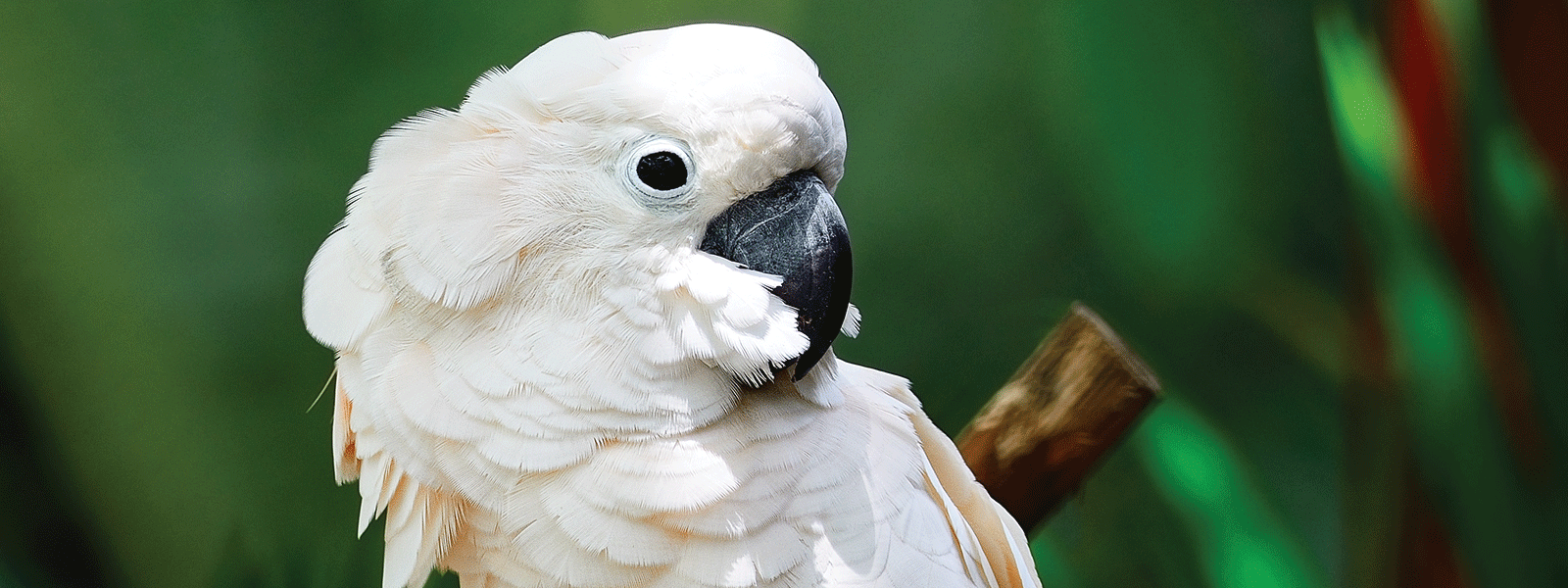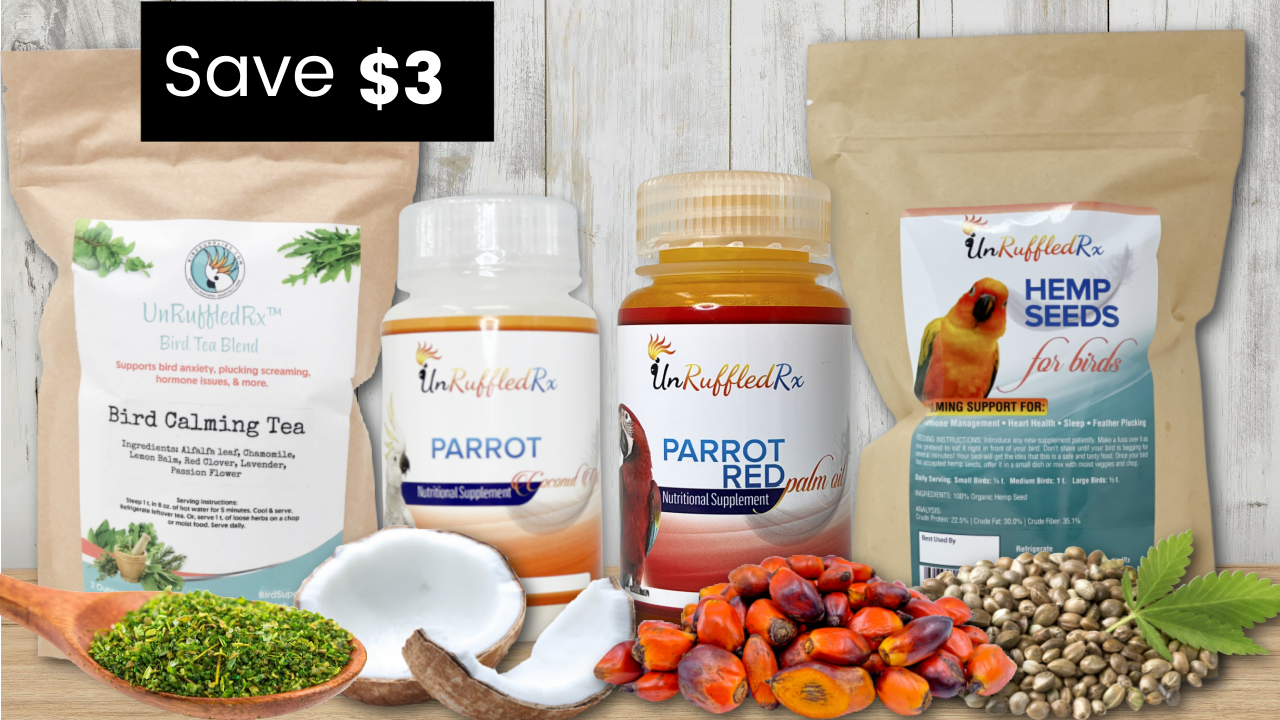Table of Contents
- What should I feed my bird daily?
- Seasonal Bird Care Care
- General Bird Care
- What is the best bird cage for my bird?
- What perches are best for birds?
- How do you keep a bird cage clean?
- Can I give my bird a bath?
- How do I keep my parrot safe?
- Get your FREE printable bird care guide
From observing your parrot's charming antics to weighing them on a gram scale with the precision of a scientist, we've got you covered. Get ready for a journey that combines expert advice, whimsical bird quips, and actionable tips to ensure your avian companion soars with health and happiness! 🦜✨
What should I feed my bird daily?

Diet: Seeds vs. Pellets
Seed diets, while more affordable, simply don’t provide the nutrition that parrots need. Seeds are high in fat, which most captive birds don’t need. Plus, they are very low in essential vitamins, minerals, and proteins that keep a bird healthy.
Over time, birds fed a seed diet will fall victim to a compromised immune system leaving them vulnerable to infections and illness.
There are a number of specialty pelleted diets made specifically for birds. Pellets are formulated to provide a proper balance of nutrients that your bird requires for ideal health.
Many Avian Vets recommend Harrison’s Bird Foods and Roudybush. They also recommend a rich range of fresh, raw plant-based foods.
if you're struggling with converting your bird to healthy pellets grab a copy of my by bird diet conversion book.
Supplementing Pellets
Check this list of foods to avoid.
Supplement bird pellets with a rich variety of raw (uncooked) or gently warmed plant-based foods that offer your bird the greatest range of bio-available nutrients. You’ll want to feed fruits and vegetables high in vitamin A, magnesium, and calcium. You'll also want to ensure that your bird gets a dash of essential fatty acids like coconut oil and red palm oil.
Always wash fruits and vegetables as your bird is susceptible to the toxins in pesticides. Diluted GSE safely cleans toxins off of vegetables.
Water
Make time every day to ensure that your bird has fresh water. In hot summer months you should change the water in both the morning and evening.
Birds love to dip pellets or food in water leaving it susceptible to spoiling. They also tend to bathe in it and use it as a toilet bowl.
Imagine the bacteria and fungus that can grow in water in just a few short hours. Wash bowls thoroughly at least once a day.
The white filmy stuff on the bowl surface is full of bacteria and fungus. Contaminated water can cause fungal infections that are deadly, take months to recover from, and are expensive to diagnose and treat.
Avoid the heartbreak and just offer clean water at all times. Make offering fresh water part of your morning bird care plan.
Seasonal Parrot Care
To care for your bird, you have to be aware of seasonal changes. In the winter, you need to make sure that your bird stays warm, while in the summer, you need to make sure that it doesn't get overheated. Make sure that your bird has safe, supervised outdoor access during the summer months.
Many bird's undergo stressful molts between January and March and their body can be depleted of nutrients as they grow new feathers. Generally, the molt is followed by a natural hormonal period during which time the adult bird would be preparing to find a mate, prepare a nest, and rear young. This is another time of year that your bird's body will undergo dramatic changes.
❄️ Winter Bird Care:
🌱 Spring Hormone Care for Birds:
☀️ Summer Bird Care:
🍁Fall Bird Care:
What type of bird cage is best?
To encourage exercise, always provide the largest cage you can afford. Keep in mind that the bar space of the cage should not be larger than your birds head. You don’t want your bird to get its head stuck between the bars.
Stick with American-made powder-coated cages or stainless steel cages to avoid metal toxicity. Birds seem to get a lot of enjoyment rubbing their beaks up and down the cage bars.
Inferior cages can poison your bird with lead or zinc. While you may think you are saving money by purchasing a used or cheap cage, it may be a decision that you regret later.
When choosing a bird cage, look for one with a big door. Also, examine the bird cage for crevices where food and poop can get stuck. The fewer places that you have to scrub the easier it will be for you to maintain your bird care plan.

Peachy, Moluccan Cockatoo
What perches are best for birds?
Provide a variety of appropriate sized perches for your bird. Good choices are natural branches and rope perches.
On rope perches, trim strings longer than an inch in length, or better yet, avoid them altogether. Avoid dowel perches that cause foot cramping and chronic foot problems.
It is important to keep bird perches clean. Bird's like to rub their beak on perches to clean them. The trouble is that dried food on the perches can harbor bacteria and fungus, potentially infecting your bird's feet. Soak soiled perches in hot, soapy water and scrub clean.
How do you keep a bird cage clean?
In addition to cleaning perches and food and water bowls, routinely wipe cages down with a bird safe disinfectant, such as a 50 / 50 mix of hydrogen peroxide and water,
Avoid bleach. It is extremely toxic when inhaled and it is caustic and can damage your cage. You can use A & E makes a good cage cleaner that dissolves stubborn poop and food stains, however, it does not disinfect.
Change cage paper routinely. When food, poop and water mix, on tray paper or substrate, it makes a nasty breeding ground for deadly fungus and bacteria. An easy way to keep the tray clean is to buy a commercial bird cage liner that is moisture resistant. Stack a weeks worth of cage liners in at the beginning of the week and remove the soiled papers every day.
If your bird’s immune system is compromised due to stress, bacteria, fungus, or poor diet, the outcome could be disastrous. Save yourself a lot of heart ache by making cleaning a part of your routine bird care plan.
Can I give my bird a bath?
Regular baths rinse dust and dirt from your bird’s feathers, skin and even from its sinuses. Baths moisturize skin, too. Bathing options include misting, bathing in a bowl, or using a shower perch to bring your bird in the shower. Wild birds bathe almost daily, but we need to make bathing a fun experience for our pets.
Find the bathing method that your bird most enjoys. Take the training slowly and always keep things upbeat and fun. Praise your bird anytime shows more confidence in bathing.
We recommend that you bathe your bird minimum of three times a week, even in the winter. Dusty species like cockatoos, cockatiels and African grey's will benefit from rinsing the dust off of their skin and feathers. You may worry that your bird will get chilled so bathe them in the morning when they have all day to dry and keep them in a warm, draft-free area to dry off. Never use a space heater around your bird, though, because most space heaters emit toxic fumes.
How do I keep my parrot safe?

Bird-Proofing Your Home
Plan on “bird-proofing” your home, just as you might if you had a toddler in the house. Birds are incredibly curious and they’ll chew electric wires, explore electric outlets, chew up stuff that isn’t good for them etc.
According to PetAssure.com the 10 most common dangers to pet birds include:
Clipping Your Bird’s Wings
While clipping your bird’s wings is a personal choice, keep in mind that flighted birds are susceptible to in-home injury and prone to flying out of an open window or door.
Some of the more common flight injuries that we hear about include drowning in open water, such as toilets, flying into windows or ceiling fans.
Metal Toxicity and Swallowing Toxic Items
Birds instinctually mouth everything, leaving them susceptible to ingesting poisonous metals such as lead and zinc or other toxic items. You’d be amazed at the things in your home that contain lead and other metals.
Anything that has been soldered contains lead. This includes lampshades, stained glass and stereo equipment. Lead is in curtain weights, old paint or painted cages from undeveloped countries such as Mexico or China,
Chipped ceramic bowls contain lead. Costume jewelry, foil, aluminum cans, foil from the top of wine and beer bottles, floor linoleum and even min-blinds contain toxic lead and zinc.
Symptoms of lead toxicity include incoordination, seizures, anemia, and kidney damage. If your bird has any of these symptoms, seek veterinary care immediately.
Protect Your Bird from Airborne Toxins
Birds are particularly sensitive to airborne toxins due to their super-efficient respiratory system. While their respiratory system enables them to fly, it poses problems in an enclosed household.
Common airborne toxins include any non-stick surface, such as Teflon-coated cookware, drip pans, irons and self-cleaning ovens. Never allow Teflon to overhead.
Toxic fumes are deadly to birds. Your bird can get toxicity pesticides, wet paint, floor and rug cleaning solutions, wood burning fireplace smoke, air fresheners, incense, scented candles, hair spray, perfume, hot-oil frying, cleaning products, and burning plastic, just to name a few.
Cigarette or marijuana smoke is very toxic to birds, too. As a rule of thumb, avoid using any substance that gives off fumes or odors. Always remove your bird from the immediate area and air out your home if you smell any of the above odors.

When developing your bird care plan, take a look at your pots and pans and other household items that contain teflon. It could be an iron, to an electric cooking appliance. Always unplug electric appliances that contain teflon.

Supervise Your Bird with Children and Pets
Keep your bird away from cats, dogs, ferrets, larger birds and other potentially harmful animals. Wild animals have even been known to enter pet doors and attack pet birds.
Never allow small children to play with a pet bird unless they are closely supervised.
If another animal bites or mouths your bird, seek an IMMEDIATE appointment with a veterinarian, preferably an avian vet. Animal saliva is deadly to birds.
When developing your bird care plan, figure out a way to keep small birds away from other household pets.
Provide Your Bird with Safe Toys
Safe bird toys are essential to your pet’s well-being. The key word here is “safe.” As a general rule of thumb, I encourage my customers to buy toys made from manufacturers who's name you can pronounce. Stick with US made toys and avoid cheap knock-offs found on online market places.
Make sure that the metal hardware or embellishments are made from bird safe substances to avoid metal toxicity. Ensure that the toy is properly sized for your parrot species.
Larger parrots often break off plastic parts and swallow them. Rope toys should be inspected frequently and strings trimmed to avoid neck or toe strangulation. Inspect bird toys for wear and tear at least weekly.
Veterinary Care
Watch for the following signs of sickness in birds. Birds instinctually hide illness until it is critical. Learn the signs of a sick or injured bird.
- Poor appetite and activity level
- Sitting fluffed, especially on the bottom of the cage
- Sleeping more than usual
- Respiratory symptoms such nasal discharge, sneezing, wheezing or crackling breathing sounds
- Unusual droppings or regurgitation that is not associated with hormonal behavior.
As part of your bird care plan, keep your avian veterinarian's phone number handy and maybe even on speed dial on your cell phone.
BIRD CARE CHECKLIST
DAILY BIRD CARE TASKS
8 Signs of a Sick Bird:
-
Lethargy
-
Changes in droppings
-
Discharge from eyes or nose
-
Difficulty breathing (visible check movements or tail bobbing with each breath)
-
Changes in appetite
-
Weight loss
-
Changes in vocalization
-
Feather fluffing or abnormalities
8 Signs of a Healthy Bird:
-
Active and alert
-
Bright, clear eyes
-
Smooth and clean feathers
-
Normal droppings
-
Good appetite
-
Clear breathing
-
Responsive to the environment
-
Engages in normal activities
Remember, birds often hide signs of illness, so keen observation is crucial!
-
Pellets - 40 - 60% of diet
-
Bird Chop or a diverse range of plant-based foods
-
Fresh water
-
Clean bowls
-
Wipe off poop and food splatters
-
Ensure perches are clean
-
Check for anything unsafe in the area
-
Change tray paper (Tip: Stack bird cage paper for easy removal of the top layer)
-
Spray feathers with water or bird-safe spray
-
Restock foraging bird toys
-
Offer sensory enrichment such as playing the TV or radio
-
Make sure they have chew toys
-
Provide 60 minutes or more out of cage time with the family every day
-
Provide them bird stand play time
-
Create foraging stations in locations throughout the cage
WEEKLY BIRD CARE TASKS
Closely examine
Do a more thorough cage cleaning
MONTHLY BIRD CARE TASKS
Plan bird training goals for the month.
Check birds supplies like bird food, bird toys, and accessories and reorder as necessary
Using a mild detergent or disinfectant (50 / 50 hydrogen peroxide water) spray and wipe down cage paying particular attention to crevices, corners, and trays. Soak and scrub perches.
ANNUAL BIRD CARE TASKS
Schedule an annual wellness exam
Resources:
https://www.petassure.com/new-newsletters/top-10-dangers-to-pet-birds/
Related Posts
6 Essential Dimensions of Avian Wellness
5 Do's & Don'ts For Better Winter Bird Care
Keep Your Bird Cozy This Winter Without Breaking The Bank
What You Should Be Doing To Give Your Parrot The Best Care This Winter
Diane Burroughs, LCSW is a licensed psychotherapist trained in ABA therapy techniques. She specializes in avian anxiety disorders and is certified in Nutrition For Mental Health. Diane has written a number of bird behavior books and she offers behavior consultations. She's developed a range of UnRuffledRx Science-backed Parrot Wellness Supplies.
Diane's products have been featured in the Journal of Avian Medicine and Surgery and at Exoticscon, a conference for exotic pet veterinarians. Her bird collars & supplements are stocked in avian vet clinics and bird stores throughout the US. With over 30 years in the field of behavior, Diane has created thousands of successful individualized behavior plans that help pets thrive.
TAGS: #BirdCare #ParrotCare #BirdCareGuide #CaringForPetBirds
SHARING IS CARING! PLEASE SHARE ON YOUR FAVORITE SOCIAL MEDIA NOW!




